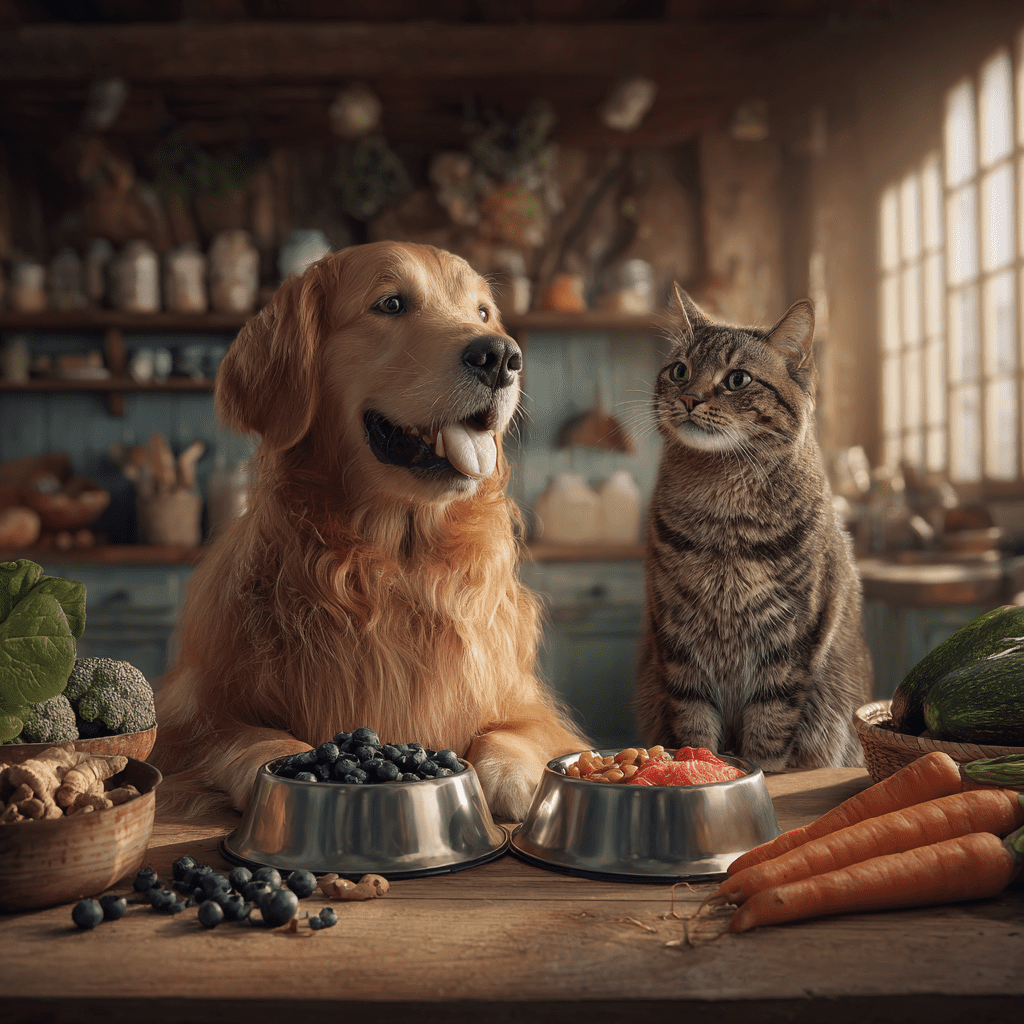Introduction: What Are Superfoods for Pets?
When you hear the word superfoods, you might think of blueberries, kale, or quinoa for humans. But did you know that your furry friend can also benefit from certain nutrient-packed foods? For pets, superfoods are natural, whole foods that provide exceptional health benefits beyond basic nutrition.
Adding the right superfoods to your dog or cat’s diet can help improve digestion, strengthen immunity, enhance coat shine, and even prevent chronic diseases. However, not every human “superfood” is safe for pets, so knowing what to feed—and how much—is key.
In this guide, we’ll explore safe, nutrient-rich superfoods for pets, their benefits, and how to incorporate them into daily meals.
1. Why Superfoods Matter for Your Pet’s Health
A healthy pet diet goes beyond protein and basic kibble. While commercial pet foods provide essential nutrients, many contain fillers, artificial additives, or overly processed ingredients. Superfoods can fill nutritional gaps and provide antioxidants, omega fatty acids, vitamins, and minerals that boost your pet’s overall well-being.
Key benefits of adding superfoods to your pet’s diet:
- Stronger immunity – Antioxidants fight inflammation and disease.
- Better digestion – Fiber supports gut health.
- Healthier skin & coat – Omega-3s reduce dryness and shedding.
- More energy – Natural nutrients fuel vitality.
- Disease prevention – Some superfoods reduce the risk of cancer, heart disease, and arthritis.
2. Safe & Healthy Superfoods for Dogs

a) Blueberries
- Benefits: Packed with antioxidants, vitamin C, and fiber. Helps protect against cell damage and aging.
- Serving Tip: A few blueberries as a snack or mixed into kibble.
b) Pumpkin
- Benefits: High in fiber for digestion, helps with constipation or diarrhea, rich in vitamin A for vision.
- Serving Tip: Plain, cooked pumpkin puree (no sugar or spices).
c) Salmon
- Benefits: Rich in omega-3 fatty acids for a shiny coat, reduced inflammation, and improved brain health.
- Serving Tip: Cooked, deboned salmon or salmon oil supplement.
d) Sweet Potatoes
- Benefits: Packed with fiber, beta-carotene, and vitamins B6 and C for immune and eye health.
- Serving Tip: Boiled or baked, served in small pieces.
e) Chia Seeds
- Benefits: High in omega-3s, fiber, and antioxidants. Supports joint, heart, and coat health.
- Serving Tip: Sprinkle ½ teaspoon over your dog’s meal.
3. Safe & Healthy Superfoods for Cats
a) Sardines
- Benefits: Excellent source of omega-3 fatty acids and protein for brain, skin, and coat health.
- Serving Tip: Choose unsalted, canned sardines in water.
b) Cooked Eggs
- Benefits: Rich in protein, amino acids, and vitamins for muscle strength and overall health.
- Serving Tip: Scrambled or boiled, without seasoning.
c) Spinach
- Benefits: Contains iron, calcium, and vitamins A, C, and K for bone and eye health.
- Serving Tip: Steam lightly before adding to food.
d) Bone Broth
- Benefits: Great for hydration, joint health, and digestion.
- Serving Tip: Serve as a warm topper for dry cat food.
e) Pumpkin
- Benefits: Helps with hairball control and digestion.
- Serving Tip: A teaspoon mixed into wet food.
4. Superfoods That Work for Both Dogs and Cats
Some superfoods are safe and beneficial for both species:
- Carrots: Vitamin A for eye health and immune function.
- Cranberries: Support urinary tract health.
- Coconut Oil: Promotes healthy skin, coat, and digestion.
- Quinoa: A gluten-free source of protein and amino acids.
- Kale: Rich in antioxidants and vitamins for disease prevention.
5. How to Safely Introduce Superfoods to Your Pet’s Diet
Step 1 – Start Small
Introduce one new superfood at a time in tiny portions to monitor for allergies or digestive upset.
Step 2 – Watch for Reactions
If you see vomiting, diarrhea, or skin irritation, stop feeding the new food.
Step 3 – Balance Is Key
Superfoods should complement, not replace, a balanced pet diet.
Step 4 – Consult Your Vet
Always check with your veterinarian before making significant dietary changes.
6. Superfoods to Avoid for Pets
Not all “healthy” foods for humans are safe for animals. Avoid these dangerous foods:
- Grapes & raisins (kidney failure risk)
- Onions & garlic (toxic to red blood cells)
- Avocado (contains persin, toxic to some animals)
- Chocolate (theobromine toxicity)
- Macadamia nuts (cause weakness and tremors)
7. Easy Superfood Recipes for Pets
a) Dog Superfood Bowl
- Cooked quinoa
- Steamed carrots
- Shredded cooked salmon
- A sprinkle of chia seeds
b) Cat Superfood Feast
- Canned sardines (unsalted)
- Steamed spinach
- Bone broth topper
Conclusion: A Boost for a Longer, Healthier Life
Adding safe, nutrient-dense superfoods to your pet’s diet is one of the easiest ways to enhance their health naturally. A spoonful of pumpkin here, a few blueberries there, or a splash of bone broth can make a huge difference.
Your furry friend relies on you to make the best nutritional choices—and with the right superfoods, you can give them a healthier, happier, and possibly longer life.
